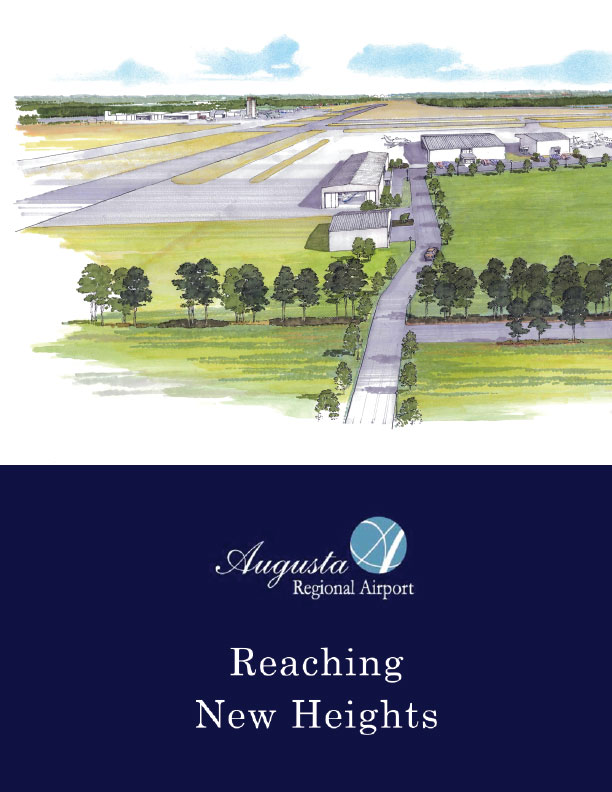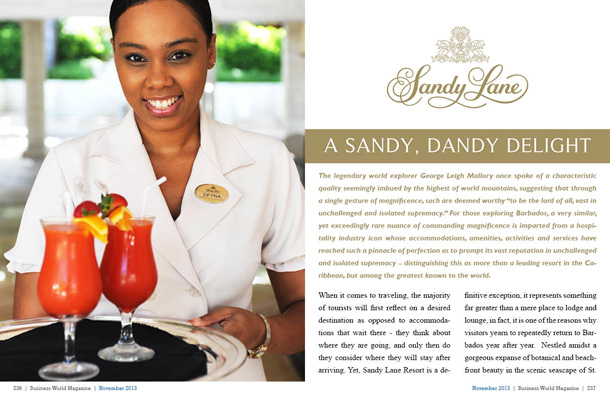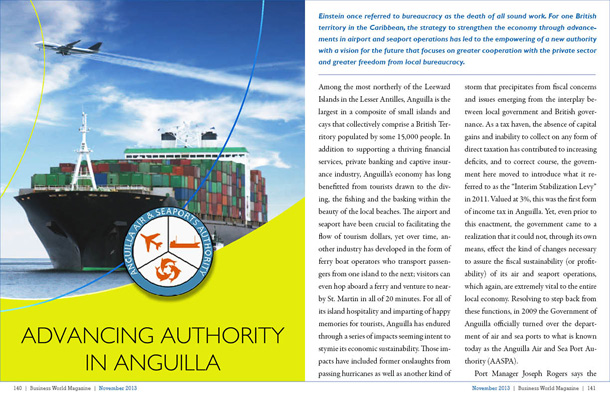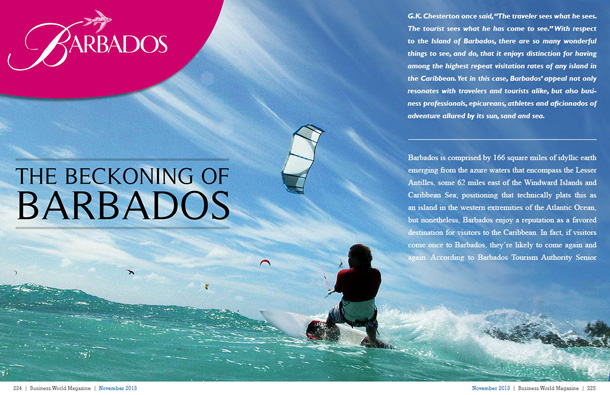
The Beckoning of Barbados
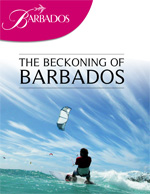
G.K. Chesterton once said, “The traveler sees what he sees. The tourist sees what he has come to see.†With respect to the Island of Barbados, there are so many wonderful things to see, and do, that it enjoys distinction for having among the highest repeat visitation rates of any island in the Caribbean. Yet in this case, Barbados’ appeal not only resonates with travelers and tourists alike, but also business professionals, epicureans, athletes and aficionados of adventure allured by its sun, sand and sea.  Â
Barbados is comprised by 166 square miles of idyllic earth emerging from the azure waters that encompass the Lesser Antilles, some 62 miles east of the Windward Islands and Caribbean Sea; positioning that technically plats this as an island in the western extremities of the Atlantic Ocean, but nonetheless, Barbados enjoy a reputation as a favored destination for visitors to the Caribbean. In fact, if visitors come once to Barbados, they’re likely to come again and again. According to Barbados Tourism Authority Senior Vice President Averil Byer, repeat visitation rates exceed more than forty percent, among the highest of any Caribbean island.
Of course, it isn’t difficult to understand the island’s allure, from its beautiful white sand beaches to its marvelous marine escapes which exhilarate divers, surfers, sailors and fisherman alike. Byer says other natural wonders include Harrison’s Cave. Located within the central uplands of the island, the cave’s crystallized limestone cavern, replete with towering columns, trickling streams and crystal clear pools of water are particularly spectacular for spelunking.  Another popular interaction with nature affords a rare opportunity to go swimming with rare sea turtles – why should fish have all the fun?
History lovers will also find plenty to explore. Barbados has the world’s rarest collection of English iron cannon from the 17th century, in fact, since the establishing of a National Ordnance Collection program, more than 400 cannon have been recovered from area gardens, cellars, beaches and beneath fortifications such as the historic Garrison at Bridgeton, a UNESCO World Heritage Site. On the island’s eastern coastline, amid the northern parish of St. Andrew, the Morgan Lewis Windmill rustically remains as one of only two intact and preserved sugar mills to be found within the Caribbean, a reminder of Barbados’ legacy in the growing of sugar cane, a crop which ultimately helped Barbados blossom as the birthplace of rum. Local distilleries such as Mount Gay have been perfecting production since1703, an era in which locals didn’t even know it as “Rum,†but by another name – “Kill Devil†(something that likely stuck after killing a few bottles).
Barbados is rich in history as one of the earliest islands to be colonized by the British, yet its history precedes the century earlier interactions with Spanish and Portuguese navigators who dubbed the island with the name of Barbados, a word that translates to “The Bearded Ones,†which as theories prevail, is either a reference to facial features of the primitive Carib Indians that inhabited here or a reference to the indigenous bearded-fig trees whose drooping roots left such an impression, historians continue to debate.
What is of no debate is the array of modern conveniences that further enhance tourism. For example, Barbados has more fine-dining per square mile than any other Caribbean Island, and its composite of internationally acclaimed chefs are especially renowned for appeasing the most discerning of epicurean appetites for quality. With its vibrant economy, social stability and advances in education, Byer says Barbados has become home to a variety of international organizations, such as UNESCO and the Caribbean Tourism Organization, which helps drive business tourism.  Barbados also benefits from distinct advantages in infrastructure. Excellent roads, clean water and sophisticated networks in energy supply and telecommunications not only contribute to the values here as a destination, but also elevate the experience for visitors. As Byer says, “Everything works in Barbados.â€
What is even more certain is the degree to which the Tourism Authority is working for the economic benefit of Barbados, for while the island may have the history, natural beauty and modern conveniences sufficient to compel tourism, the Authority has helped to not only ensure the world is aware of all that Barbados has to offer, but has strategized to capitalize on other assets of the island. As Byer explains, sports has become such a fundamental aspect of the draw here, the government took steps to create a department solely dedicated to sports tourism. While cricket has long proven to be one of the most popular sports pursuits here, drawing competitors from throughout the Caribbean, Barbados routinely plays host to sailing competitions and regattas that attract mariners from around the world. Polo has also become an increasingly popular venue over the years and Barbados is home to some of the world’s finest polo courses. Barbados also benefits from exhibitions in tennis and indulgences in golf. Quite often, the staging of sporting events occurs in such a way to advance other offerings in the arts through concerts and cultural celebrations.
The Government here has also taken steps to protect and preserve assets in terms of quality accommodations. For example, it has invested in properties and partnered with the private sector to manage those properties. One such arrangement exists with the Hilton hotel brand. In another case, when a hotelier affiliated with a long standing property at Almond Beach pulled out of the market, rather than let that infrastructure dwindle to naught, the Government stepped-in to acquire the property and is currently negotiating a management deal reportedly with industry dynamo Sandals Resorts.
Visitors have a range of excellent options in accommodations, but repeat visitors further benefit from programs that pay particular reward to their patronage. At least four times a year, the Barbados Prime Minister invites repeat visitors to a special reception, held in their honor, at his personal residence. Byer says these catered affairs help communicate how much Barbados appreciates its visitors. And while interaction with the Prime Ministers certainly makes for a memorable experience, Byer notes that visitors will glean the same sense of hospitality from simply interacting with the locals. She says the people of Barbados represent the island’s greatest asset. “Everyone here understands and appreciates the importance of tourism … we’re happy that visitors come here and we want them to have such an enjoyable experience that they will want to come back again,†– and indeed, they do.
To learn more about the events, activities and opportunities for relaxation, recreation or exhilaration in Barbados, visit the Barbados Tourism Authority website at www.visitbarbados.org.


